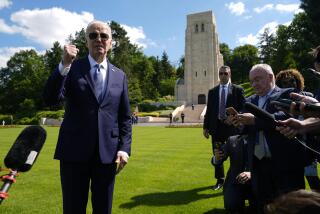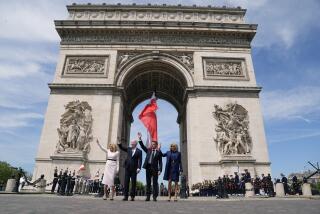Gorbachev in France: Politesse Over Realities
- Share via
PARIS — Ever since the days of Charles de Gaulle, president of France from 1959 to 1969, the idea of a “special relationship” between France and the Soviet Union has been a fixation, if not an illusion, of French foreign policy.
It came as no surprise to the French, then, that Soviet leader Mikhail S. Gorbachev has chosen to make France his first Western port of call after assuming power. He will come here even before he sees President Reagan in Geneva in November. And when Gorbachev arrives in Paris on Wednesday he can be assured of a proper welcome, though there will be more cordiality, politesse and enthusiasm than hard realities.
It will be a visit organized and arranged like nouvelle cuisine --high on decorative presentation and delicate in flavor, but low in sustenance and not much to take away other than the impression of having dined elegantly and well.
Gorbachev and President Francois Mitterrand will both be looking for superficial success; that will probably not be difficult to arrange. The visit will certainly be a domestic political boost for Mitterrand, under siege over the sinking of the Greenpeace ship Rainbow Warrior in New Zealand by French agents in July.
Gorbachev, on the eve of the Reagan meeting, will get another Western opportunity to display the image of new Soviet leadership--peace-loving, flexible, reasonable, vigorous, persuasive, urbane.
So the visit is certain to be a “success.”
Throughout this 25-year search for a “special relationship,” from De Gaulle to Mitterrand, there has almost always been more superficiality than substance to the goings-on between Paris and Moscow. Invariably, France makes the gestures and then bumps up against the hard reality.
De Gaulle spent roughly five years, from the end of the Cuban missile crisis to the Soviet occupation of Prague in 1968, in an effort to swing French foreign policy from its Atlanticism to his vision of “Europe from the Atlantic to the Urals.” He genuinely believed that the Soviet Union was becoming more benign and France, in this period, voted regularly with the Soviet Union in the United Nations and against the United States.
Then came the Prague Spring, and De Gaulle’s hopes for a continent in which the power blocs would fade away were back to square one.
With the invasion of Afghanistan in 1979, President Valery Giscard d’Estaing misgauged the “special relationship.” After deliberately muting any French condemnation of the invasion, he arranged to fly to Warsaw secretly to meet Soviet leader Leonid I. Brezhnev for a discussion and “clarification” of the Soviet action. All this was touted by the French president as evidence of the “special relationship” at work.
But the rush to Warsaw was seen by the French and their European allies as a blunder, one that appeared to put the French seal of approval on the Soviet action. It was a blunder, moreover, that contributed to Giscard’s defeat by Mitterrand in the presidential election a year later.
When Mitterrand took office, he took the Communists into the government for the first time since 1947. At the same time he toughened up the anti-Soviet stance of French foreign policy. With the Communists in the Cabinet room, Mitterrand vigorously campaigned for installation of advanced U.S. missiles in West Germany and in territory of other North Atlantic Treaty Organization allies; he warmed French relations with both Washington and NATO.
But this did not prevent him from taking an utterly unyielding line against the United States over French contracts to build the Siberian gas pipeline, which the Reagan Administration tried to block. Moreover, at the height of the controversy, the French signed a massive contract for supplies of natural gas from the Soviet Union--a clear signal to Moscow that the “special relationship” was not entirely dead.
More recently, Mitterrand’s opposition to the American “Star Wars” project has not gone unnoticed in the Kremlin, even if his reasons and qualifications are very different from Moscow’s. Mitterrand does not object to research and development, but the French are highly skeptical about the ultimate feasibility of the proposed space-based defense system and are totally opposed to any shift to a “defense-oriented” nuclear strategy for the West.
So France under Mitterrand will have nothing to do with the “Star Wars” program as a government--but if French industry wants to have a go, Mitterrand apparently will not object. Whatever satisfaction Gorbachev can take from this is likely to be tempered by Mitterrand’s flat refusal to countenance the inclusion of France’s land-based missiles and sea-launched Polaris-type submarine missiles in any superpower arms-reduction deal in Geneva--as has been suggested repeatedly by the Soviet Union.
All of which leaves precious little for Gorbachev and Mitterrand to agree to or even talk about next week. Mitterrand will certainly have something to say to Gorbachev in private, and something in public as well--about human rights, among other things. If Gorbachev has something new to propose, something that represents real progress toward a new detente, then France will certainly welcome it.
More to Read
Sign up for Essential California
The most important California stories and recommendations in your inbox every morning.
You may occasionally receive promotional content from the Los Angeles Times.













